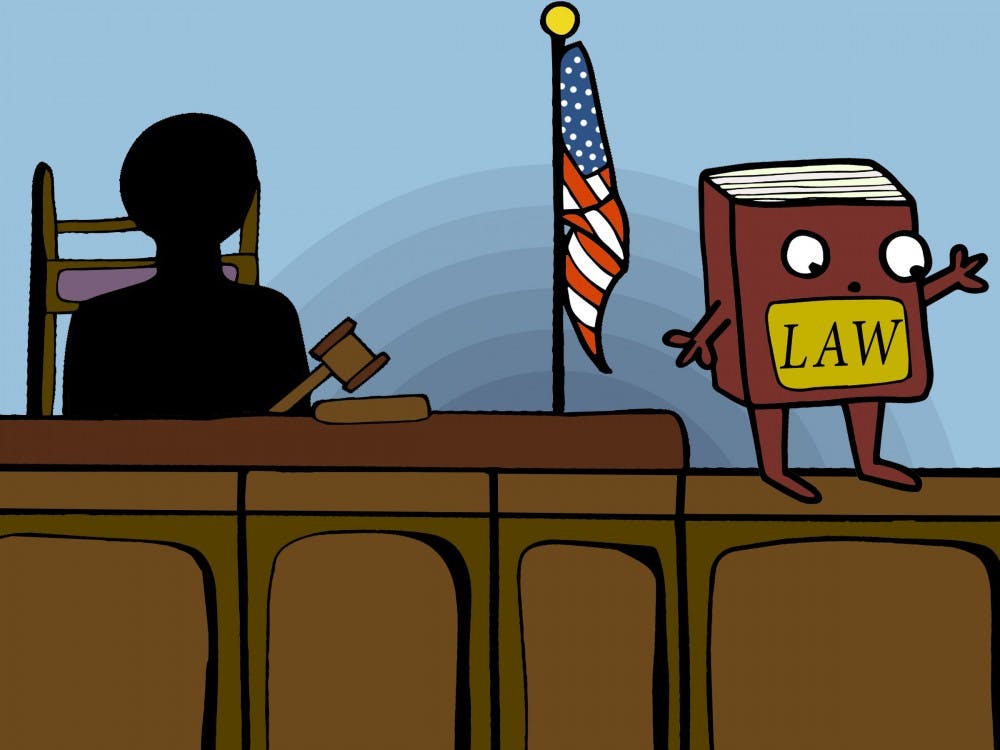Psst. Wanna hear a secret that government officials and law enforcement want to stay a secret?
This secret has a name, and prosecutors and police react wildly when they hear it — it is jury nullification.
It is in many students' interest to know more about this, as voters in Arizona have yet to decriminalize the use of marijuana, and even if they do, the federal government still reserves the ability to arrest and prosecute anyone over the drug, regardless of state law.
The latest government statistics on marijuana show that 41 percent of college age adults use marijuana at least once a year. Should all of these people be imprisoned? The law thinks so.
Jury nullification allows for jurors to have a conscience where the law does not. This applies in situations where technically, the law was broken, but the extenuating circumstances allow reasonable people would decide that punishment is undue.
It also applies in cases where citizens believe the law to be wrong. This is quite crucial, as it is one of the most direct ways for the public to communicate distaste for a law or the punishment associated with breaking it.
In other words, citizens are allowed to alter the course of a ruling due to personal beliefs.
If you do not believe someone should face two years in prison for the victimless crime of hanging out with some buds on a Friday night, you have the option as a juror to acquit without question.
A jury’s decision cannot be questioned after it has been made, and the defendant cannot be tried again due to the double jeopardy restriction found in the Fifth Amendment.
Because of its power to thwart the agenda of the government, jury nullification has gradually become a well-kept secret over time. Looking back to alcohol Prohibition in the 1920s and 30s, evidence of nullification creating change abounds, as more than 60 percent of cases that went before a jury ended with acquittals.
Who is to say that the same thing cannot be done today, as marijuana restrictions become more and more unpopular?
In short, jury nullification is so uncommon these days because government officials do not like it when their authority is undermined. It is very common to hear a judge inform the jury that they are only allowed to decide whether or not the law was broken, when in fact jurors are absolutely permitted to judge the law itself.
Prosecuting attorneys also make it a habit to remove potential jurors on the suspicion that they may know about nullification and have charged people with jury tampering for informing the public of their rights.
This combined with the fact that most cases never make it before a jury have allowed this right to become hidden.
So, if you want to create meaningful change on a policy level, or even grant mercy to an individual being harmed by the system, here is what you can do.
“You shouldn’t go out of your way to expose yourself as being aware of jury nullification," Tim Lynch, an attorney and legal scholar specializing in criminal justice and civil liberties, said. "You should try to get the jury process without lying, and then vote your conscience.”
Nullification allows the individual to have a conscience where the law does not; the government cannot bully you into compliance with what you know is wrong. Once again, think of the 41 percent of your peers that face felonies for marijuana use.
Supporters of a jury’s right to nullify include Supreme Court Justice Sonia Sotomayor, so you know that you have a strong legal standing if you do feel the need to nullify.
As students just newly being exposed to their full rights and responsibilities, it is important to be fully informed of them. Nullification helps students create direct change in their community.
“What we wanna do is remember that somebody’s liberty might be on the line and you have the opportunity to do something about that,” Lynch said.
If you would like to learn more, check out the Fully Informed Jury Association (FIJA).
Disclaimer: I am not urging anyone to go out and nullify on any specific cases that are currently or will later be heard in front of juries. I am simply stating that nullification is an option in our current system and that it is important to be knowledgeable of.
Reach the columnist at cwitt2@asu.edu or follow @WittCorbin on Twitter.
Editor’s note: The opinions presented in this column are the author’s and do not imply any endorsement from The State Press or its editors.
Want to join the conversation? Send an email to opiniondesk.statepress@gmail.com. Keep letters under 500 words and be sure to include your university affiliation. Anonymity will not be granted.
Like The State Press on Facebook and follow @statepress on Twitter.




